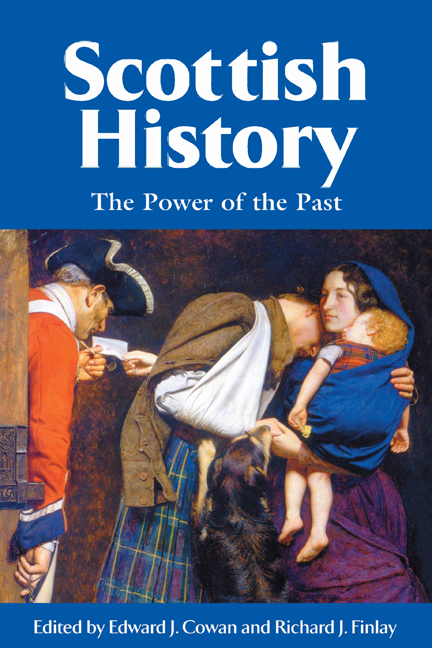Book contents
- Frontmatter
- Contents
- Contributors
- Introduction
- 1 The Picts‘ Place in the Kingship's Past Before John of Fordun
- 2 The Demonisation of King John
- 3 Late Medieval Scotland and the Matter of Britain
- 4 In Search of the Scottish Reformation
- 5 Civil Society and the Celts: Hector Boece, George Buchanan and the Ancient Scottish Past
- 6 The Covenanting Tradition in Scottish History
- 7 ‘What's in a Name?’: Pedigree and Propaganda in Seventeenth-Century Scotland
- 8 The Ideological Uses of the Picts, 1707-c.1990
- 9 The Jacobite Cult
- 10 Queen Victoria and the Cult of Scottish Monarchy
- 11 ‘Their Laurels Wither'd, and their Name Forgot’: Women and the Scottish Radical Tradition
- 12 Tomorrow's Ancestors: Nationalism, Identity and History
- Index
2 - The Demonisation of King John
Published online by Cambridge University Press: 24 September 2020
- Frontmatter
- Contents
- Contributors
- Introduction
- 1 The Picts‘ Place in the Kingship's Past Before John of Fordun
- 2 The Demonisation of King John
- 3 Late Medieval Scotland and the Matter of Britain
- 4 In Search of the Scottish Reformation
- 5 Civil Society and the Celts: Hector Boece, George Buchanan and the Ancient Scottish Past
- 6 The Covenanting Tradition in Scottish History
- 7 ‘What's in a Name?’: Pedigree and Propaganda in Seventeenth-Century Scotland
- 8 The Ideological Uses of the Picts, 1707-c.1990
- 9 The Jacobite Cult
- 10 Queen Victoria and the Cult of Scottish Monarchy
- 11 ‘Their Laurels Wither'd, and their Name Forgot’: Women and the Scottish Radical Tradition
- 12 Tomorrow's Ancestors: Nationalism, Identity and History
- Index
Summary
At first glance, King John Balliol, the man on the Scottish throne at the beginning of the wars between Scotland and England in 1296, seems a poor historiographical subject, for the simple reason that one generally assumes that history is unanimous in its opinion of him: he was useless. Indeed, his general hopelessness has been so taken for granted that there has not yet been a coherent study of the man and his kingship, though histories of the period as a whole cannot avoid his reign en route to the far more satisfactory prospect of an analysis of that of King Robert Bruce. Such a situation is revealing in itself: it is accepted that Balliol is an irrelevancy, an interruption to the main story; even in recent historiographical times, when historians are trained to assume nothing, it has still been supposed that this 700-year-old presumption of incompetence in an overwhelming body of historical material must be more or less right.
But suspicions are growing. To some extent, this is a product of increasing scepticism about the reputation of Robert Bruce, which historians in the last thirty years, but particularly in the last ten, have finally begun to discuss seriously, though this has tended to be in huddled corners of conferences rather than in print. The admission of the possibility that the mighty propaganda machine which explicitly defended the honour, rightful royal claim and sovereign status of Scotland's hero-king might have had a profound effect on the writing of the history of Bruce's reign is now finding a more general acceptance, even if the implications of this have not yet been fully explored; it therefore follows that the period prior to Bruce's seizure of the throne in 1306 has been at least as affected by the need for the usurper king to explain away the tawdry events of his early career and how he came to be on the throne at all.
But this chapter is emphatically not about Robert Bruce, though his family certainly features. If one looks at how King John has been written about from his own times until now, the first thing that one notices is that though there is certainly a veneer of uniformity of opinion about him, this breaks down fairly quickly in the detail given for specific events.
- Type
- Chapter
- Information
- Scottish HistoryThe Power of the Past, pp. 29 - 46Publisher: Edinburgh University PressPrint publication year: 2020



